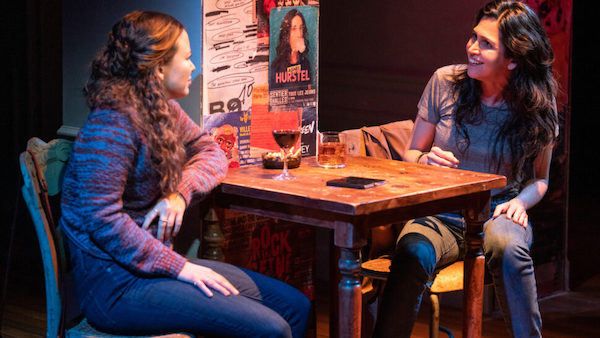Theater Review: “Prayer for the French Republic” — No Safe Haven
By Melissa Rodman
Joshua Harmon’s serious but not solemn play focuses on a Jewish family in Paris grappling with the rise of antisemitism.
Prayer for the French Republic by Joshua Harmon. Directed by David Cromer. Produced by Manhattan Theatre Club. Staged at New York City Center Stage I, through March 27.

Molly Ranson and Francis Benhamou in Prayer for the French Republic. Photo: Matthew Murphy.
Unease simmers in Paris. It is 2016: one year after the Charlie Hebdo shooting, one year after an attack on a kosher grocery store. Onstage, Daniel Benhamou (Yair Ben-Dor) stumbles into his parents’ apartment. His face is cut and bruised. He is wearing a yarmulke. He won’t cover it with a baseball cap, even though his mother, Marcelle (a compelling Betsy Aidem), pleads with him. Antisemites have roughed him up.
This scene occurs early in the first act of Joshua Harmon’s sometimes funny, always serious, new drama. Daniel refuses to go to the hospital after the hate crime. Instead, he maneuvers his bloodied body through the front door, hoping just to lie down. Marcelle exclaims, “Not on the sofa!” The farcical moment sparks an ongoing debate within the Benhamou family: should they stay in Paris, or is it time to go? Is anyplace safe for Jews?
These are the same questions Marcelle’s ancestors, whose last name is Salomon, pondered seventy years before. In the thick of World War II, Irma (Nancy Robinette) and Adolphe (Kenneth Tigar) Salomon choose to remain shuttered in their Parisian flat. Irma thinly butters a slice of toast for Adolphe, scraping the top layer onto another piece for herself. They imagine where their children and grandchildren have fled. To Cuba? To the United States? They fantasize about a postwar reunion where “everyone will get along beautifully.” One day, their son Lucien (Ari Brand) and grandson Pierre (Peyton Lusk) return, somber and silent. The Salomons’ story unfolds alongside the Benhamous’, with Patrick (Richard Topol), Marcelle’s decidedly secular brother, serving as the narrator linking the past and the present. The stage rotates to place one time period at the center, while the other stays largely in view — sans lighting or behind a scrim. Nota bene: As the play progresses, we piece together that adult Pierre (Pierre Epstein) is Patrick and Marcelle’s father. Pierre still runs the small piano store that the Salomons have owned for generations.
There’s more family to juggle. Charles (Jeff Seymour) and Elodie (Francis Benhamou, a coincidental last name!) round out the nuclear Benhamous, as husband/father and daughter/sister. Molly (Emma Geer), a distant cousin from the U.S., has just arrived in the family’s comfortable, elegant living room. She’s spending the semester in France, eager to immerse herself in the country and improve her French. She acknowledges, and typifies, the American study abroad cliché — croissant leitmotif included. Molly’s extended weekends with the Benhamous inspire quarrels, large and small. Weighty matters that come up for vigorous discussion include religious identity, political expediency (re: Israel), and the pros and cons of uprooting the family. Domestic contretemps arise around a dirty wineglass, sleeping till noon, and wearing out one’s welcome. (“Do you think she’s mad that I was in the bathroom too long?” Molly asks Elodie about Marcelle. Elodie does not mince words: “Yes.”)
Tensions grow. “I can’t live here anymore,” Charles insists. He is less attached to Paris than Marcelle; his ancestors emigrated from Algeria in the ’60s, hers have called France home for centuries. Charles takes Daniel on a trip to Israel to scope out apartments. Marcelle attempts to counter her husband’s longing to leave: “Our lives are here.” Daniel, an unassertive presence, shrugs off the mounting dangers of antisemitism; he doesn’t really want to leave Paris either — especially since he’s become smitten with Molly. Elodie, for her part, seems more invested in stoking intellectual disputes than confronting the reality the family faces.
Marcelle’s bubbling inner turmoil spills over during a Passover seder. All evening she’s been quieter than usual. Then Daniel rises to open the front door, to let in the prophet Elijah, per the holiday ritual. “Sit! Down!” she yells, piercing the darkened theater. Patrick adds a layer of complexity to the stand-off; he reminds Marcelle that Pierre married a Catholic woman. “Papa gave us a gift,” he tells his sister, suggesting that there is no need to make a drastic move. He argues that the safest choice would be for the Benhamous to keep their religion and traditions private, confined to the home. “There are very few things worth dying for,” he adds.
The Benhamous do make a decision (no spoilers here). And the denouement emphasizes the storytelling sensibility that director David Cromer has highlighted throughout the production. Every character has to choose how to present their story, what details to include, which to leave out. We become invested in the shifting perspectives that make up this tangled yarn. On a moonlit walk, Molly tells Daniel she will brag about her time abroad — when she talks about it back in the U.S. — by referring to a French boyfriend (i.e., him), who took her out to dinner on her twenty-first birthday. She won’t mention the fact that they’re cousins. And she won’t talk about religion. “La Marseillaise” fills the theater.
Melissa Rodman writes on the arts, and her work has appeared in Public Books and the Harvard Crimson among others.

